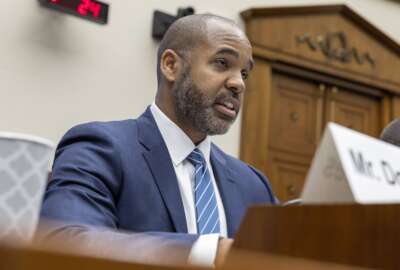Pentagon’s post-9/11 security agency marks 10-year anniversary
The Pentagon Force Protection Agency is now ten years old and four times bigger than the security agency that guarded the Pentagon on Sept. 11, 2001. PFPA is trying...
wfedstaff | April 17, 2015 3:42 pm
On the day of the Sept. 11 attacks, the agency in charge of protecting the Pentagon and its employees was made up of just a few hundred people. Today, a new agency has replaced it, the workforce has almost quadrupled in size, and as budgets decline, leaders say they are intent on protecting that strengthened workforce.
The Pentagon Force Protection Agency (PFPA) marks its tenth anniversary this week. The agency was created by Congress shortly after the 9/11 attacks when Defense leaders concluded the existing Pentagon security agency, the Defense Protective Service, lacked the staff and structure necessary to protect the nation’s military headquarters.
Today’s PFPA has about as many police officers (850) as a medium-sized city out of an overall workforce of 1,300 employees, but it dwarfs the size of the former DPS, which had only 250 law enforcement officers and 350 overall staff.
Richard Keevil, the chief of police within PFPA, said the workforce growth gave the agency more boots on the ground for traditional law enforcement, but also the ability to meet a new set of missions.
“The other boots on the ground are people who do things to support us,” Keevil told Federal News Radio during an interview at the agency’s anniversary celebration in the Pentagon courtyard. “There’s a lot of information that goes through PFPA employees every day that’s filtered and gathered and processed and analyzed. We use that every day to adjust our posture and change what the public sees, and hopefully what our adversaries see.”
The police directorate is the largest of four in the revamped security agency. Other directorates handle physical access control systems at the Pentagon, personnel security, protection of classified information, biological and radiological threats and security details for senior DoD leaders.
Keevil said like most every other corner of the federal government, PFPA is feeling the impact of budget cuts, but it’s committed to protecting the workforce growth it’s seen over the past decade.
“[Defense Secretary Leon Panetta] believes that security is one of the things we won’t compromise on, so we’re trying to keep the workforce intact,” he said. “But we see the big picture, and even with the cuts, what we’ve decided is to try to make ourselves more agile. We’re looking at areas where we can do better with less people, where we can streamline the service without compromising the service. So far, that has actually turned out pretty well.”
It also helps, Keevil said, that there are dozens of other federal, state and local law enforcement agencies in the D.C. area that PFPA can share resources with. The Department of Homeland Security’s Federal Protective Service, for example, has a mission that’s very similar to PFPA’s. The two agencies collaborate often, he said.
“After 9/11, I think if you talked to the leaders of FBI, CIA, all the other federal partners, they’d all admit to you that we weren’t doing well with sharing information,” he said. “But the change in the way that we share information has made exponential changes in the way we do business. Everyone is trying to save a buck today, and by utilizing resources from other agencies that share a specific mission so there’s not a duplication in service is a very important thing.
Keevil said law enforcement leaders in the National Capital Region are blessed with close working relationship — every chief knows every other chief by first name, he said, whether they’re federal, state or local. The agencies meet at least once a month to discuss collaboration, he said.
In the past, a lot of us liked to put our arms around our own mission and say, ‘Thanks for the offer, we’ll take care of ourselves.’ No one can afford to do that today. I don’t care who you are,” he said. “If the Department of Defense, which has a pretty significant budget, is in that kind of environment, you can imagine the smaller agencies are worse off than we are. So we have to do this.
We’re actually finding ourselves sharing things that in the past, especially DoD, would not typically want to do. We’re doing it without a lot of formal documentation or a lot of red tape so that we can just take care of the mission and take care of each other. That’s what it’s all about.”
RELATED STORIES:
Pentagon to make building access easier
Reinventing security at the Pentagon
Pentagon shooting a ‘wake up call’
Copyright © 2025 Federal News Network. All rights reserved. This website is not intended for users located within the European Economic Area.
Jared Serbu is deputy editor of Federal News Network and reports on the Defense Department’s contracting, legislative, workforce and IT issues.
Follow @jserbuWFED






